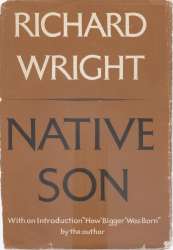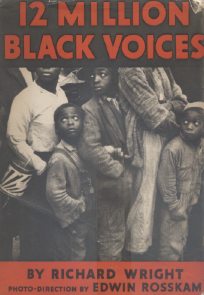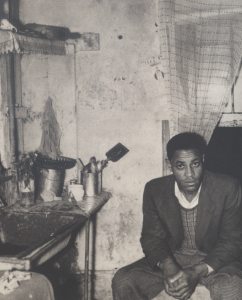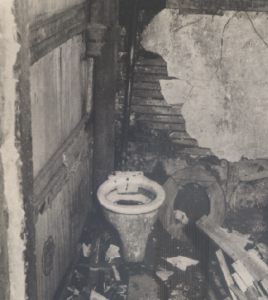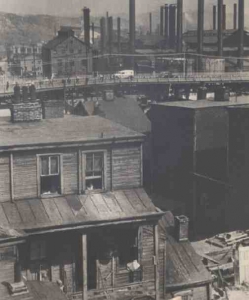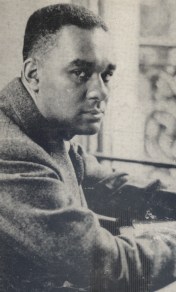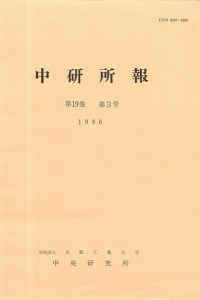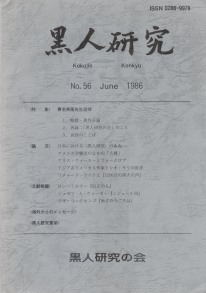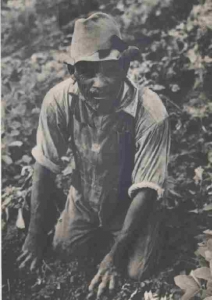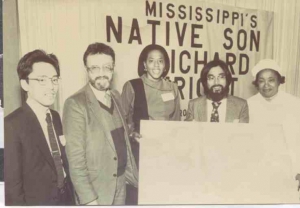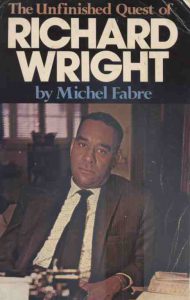概要
高校を辞め、大学を探し始めて4年目、私立の短大とか大学とか話はあるものの決まらず、結局大阪工業大学の嘱託講師(見かけは常勤、実際は非常勤)と他の非常勤をかけもちし、週に16コマの授業を持っていた頃です。
修士論文で取り上げた作品の中でも、ライトの出世作『ネイティヴ・サン』(Native Son, 1940)を、特に擬声語を手がかりに、テーマに表現をからめて考えてみました。「Richard Wright, “The Man Who Lived Underground” の擬声語表現」(1984)を書いた時に、他の作品でもテーマにからむ重要な場面で擬声語の表現が意図的に用いられていると予測し、『ネイティヴ・サン』や『ブラック・ボーイ』(1945)のような主要な作品で同じように書けないかと考えるようになっていました。
『ネイティヴ・サン』を最初に読んだ時は、その展開の早さや勢いを感じながら、2日か3日で一気に読んだ記憶があります。その印象は、やっぱり使われている言葉遣いとも密接に関係があったのだと、この小論を書きながら思いました。英語を母国語としている人たちが、この文章で分析しようとしているように感じて、意識的に擬声語を用いたのかどうか自信はありませんが、今までにない視点だと思います。
『ネイティヴ・サン』
1981年と86年にシカゴに行きましたが、この小説の舞台になったサウス・サイドには行きませんでした。81年は初めてのアメリカ行きで余裕がなかったうえ、ミシガン通りでパレードを眺め、この小説の初版本を手に入れようと古本屋をまわるだけで精一杯でした。86年は、シアーズタワーに登り、前年にミシシッピ大学であったシンポジウムでの発表者シカゴ大学のSterling Plumpp さんに会うだけで終わってしまいました。英語もあまり聞けないのに、電話をかけて自宅のマンションに会いに行きました。
日本語版は→「Native Sonの冒頭部の表現における象徴と隠喩」「言語表現研究」第4号29-45頁(1986)。
This paper aims to give an estimation of some symbolical and metaphorical expressions in the opening scene in Native Son (1940) by Richard Wright (1908-1960).
He chose the rat’s scene to open the story because he wanted to lay down some impressive event that would sound and resound in varied form throughout its length.
The story begins in a little room in Chicago’s South Side where the hero and his family live together. Wright succeeds in giving us symbolical and metaphorical meaning by making the best use of the hero, the rat, and the little room, focusing on noisiness. filthiness, and closeness.
In this paper efforts are made to show hove ~’4’right succeeds in making each of them play their part in the schemed opening scene, by making the skillful use of symbolical and metaphorical expressions.
本文
- The opening scene
Quite a few readers were shocked when they read through Native Son (1940) by Richard Wright (1908-1960). We can imagine how great its impact was even from the fact that the book was taken away from the shelves in public libraries. It was not simply because the book presented a vital problem to society’s racial crisis, but because the book was supported by its devised plot, schemes and expressions. Richard Wright(小島けい画)
Richard Wright(小島けい画)
He seems to have been at great pains to think of its opening scene when he sat down to type. The next passage tells us vividly of the difficulty :
…, when I sat down to the typewriter, I could not work ; I could not think of a good opening scene for the book. I had definitely in mind the kind of emotion I wanted to evoke in the reader in that first scene, but I could not think of the type of concrete event that would convey the motif of the entire scheme of the book, that would convey the motif of the note that was to be resounded throughout its length, that would introduce to the reader just what kind of an organism Bigger’s was and the environment that was bearing hourly upon it. Twenty or thirty times I tried and failed ; then…(1)
The text shows us his desire of setting the event in the opening scene that would sound and resound in varied form throughout its length. After many trials and errors, he finally chose the scene in which Bigger Thomas kills a rat. We see how worried he was about this “rat" by reading this section of his essay :
I went back to worry about the beginning…, one night, in desperation…I sneaked out and got a bottle. With the help of it, I began to remember before. One of them was that Chicago was overrun with rats. I recalled that I’d seen many rats on the streets, that I’d heard and read of Negro children being bitten by rats in their beds. At first I rejected the idea of Bigger battling a rat in his room ; I was afraid that the rat would “hog" the scene. But the rat would not leave me; he presented himself in many attractive guises. So. cautioning myself to allow the rat scene to disclose only Bigger, his family, their little room, and their relationships, I let the rat walk in, and he did his stuff.(2) (Emphases mine.)
It could be said that he wished to allow the opening scene to disclose the hero, his family and their relationships by making impressive use of the rat and their room where they spent their daily lives.
Now let us see how symbolically and metaphorically he devised the opening scene in this work, with emphasis on some of the key words.
II . i ) “their little room" The story begins in a tiny room in the South Side of Chicago. Wright chose the room as a familiar scene to the inhabitants of the South Side, not as a special one. The passage we now quote from 12 Million Black Voices (1941) reveals the background and the conditions of the district at the time :
12 Million Black Voices
When the white folks move, the Bosses of the Buildings let the property to us at rentals higher than those the whites paid.
And the Bosses of the Buildings take these old houses and convert them into "kitchenettes", and then rent them to us at rates so high that they make fabulous fortunes before the houses are too old for habitation…They take, say; a seven-room apartment, which rents for $50 a month to whites, and cut it up into seven small apartments, of one room each ; they install one small gas stove and one small sink in each room…because there are not enough houses for us to live in,…we rent these kitchenettes and are glad to get them,…Sometimes five or six of us live in a one-room kitchenette,…(3)
The room, in which on one bed sat three naked children looking at the other bed on which lay a man and a woman, both naked and black, and which the fugitive Bigger saw from the roof through a window and turned away, thinking it was a disgusting familiar sight, the unventilated and rat-infested one-room his lawyer Max questioned about to Mr. Dalton, the owner of the building who had exacted an exhorbitant rent from the Thomas family, and “their little room" are nothing but the “kitchenette" just quoted.
“their little room" – "kitchenettes"
On this “little room" some images are thrown, focusing especially on (1) noisiness, (2) filthiness, and (3) closeness. Now we will begin to attempt some analysis of the scene, laying emphasis on these three points.
(1) “noisiness"……In order to appeal to our ears directly, Wright uses many onomatopoeic words in this scene. Although Wright often made good use of such words in his other works, the reader is always surprised at the beginning of the story, Brrrrrrriiiiiiiiiiiiiiiiiiinng! Here is the opening scene :
Brrrrrrriiiiiiiiiiiiiiiiiiinng!
An alarm clack clanged in the dark and silent room. A bed spring creaked. A woman’s voice sang out patiently
'Bigger, shut that thing off?’
A surly grunt sounded above the tinny ring of metal. Naked feet swished dryly across the planks in the wooden floor and the clang ceased abruptly.
'Turn on the light, Bigger.’
'Awright,’ came a sleepy mumble.(4)
The second line tells us that the unfamiliar word is the sound of an alarm clock. Both the verb “clang," imitative of that sound, and the noun “clang" in the sixth line hint that the metallic sound resonates loudly in the little room.(5) The spelling of Brrrrrrriiiiiiiiiiiiiiiiiiinng! makes us feel something extraordinary. It reminds us of the following scene in The Long Dream, where he uses the same pattern. In this scene the six-year-old protagonist is asked to look after his father’s funeral parlor at midnight and begins to feel worried when he discovers the mischief he has done with his friends to a white lady passing by frightens himself as well :
They entered the office and stood in the dark.
Brriiiinnnnnnnnnnng!
The phone’s metallic ringing shattered the dark and the boy’s muscles grew stiff. They could hear one another’s breathing.
Brrriiiiiinnnnnnnnnnnnnng.
“Oh Lawd. I got to answer." Fishbelly whispered stickily….
Brriiiiiiiinnnnnnnng.~ Brrriiiiiiiiiiiinnnng.“(6)
We find that Wright spells thus to imitate the sound of the phone, but also notice that the words are spelled differently from the sound of the clock. He uses more “n"s, particularly suitable for expressing grumbling reverberation.(7) He must have given weight to a lingering echo of the sound. It is no wonder that the bell rings furiously with a lingering echo as it is midnight and in the wide concrete basement of the undertaking establishment. But also, we can not miss his elaborate contrivance for each spelling of the bell. The contrived expressions bring forth the sensitive feelings of a boy in the South who can never forget the uncertainties contained in cz-ord~ such as “a white woman" and “the lynching."(8)
If we can say he emphasizes a lingering echo by the expressions of the bell, it might be also said he emphasizes clamorousness and restlessness by those of the clock. “Brrrrrrriiiiiiiiiiiiiiiiiiinng!" includes the vowel “i" to symbolize swiftness and abrupt-ness,(9) while the two “clang"s of the clock characterize loudness. Taking into consideration the restless development of the story which moves swiftly with two murders, a flight scene, and an arrest, this noisy sound of the clock, which symbolizes clamorousness and restlessness, is to be the fittest bell tolling at the opening of this story. With this in mind, the next comment is to the point : Brrrrrrriiiiiiiiiiiiiiiiiiinng! is the shrieking sound of the clock in the first line which is the signal bell of the opening. This grating metallic sound rings in succession throughout the length of the story. Every incident of the story moves swiftly together with the clamorous sound of this alarm clock.(10)
The sound of the clock plays the leading part, while various other sounds fill the supporting roles of the opening scene. Strictly speaking, it is the clock, the bed spring, Bigger’s feet and the floor, his mother, and Bigger that virtually give forth sounds or voices. Apart from the clock sound and their conversations, the sentences can be put in the simplified Subject+Verb form : clock+clang./spring+creak/voice+sing/grunt+sound/feet+swish/clang+cease/mumble+come. (The underlined parts are onomatopoeic words.) “Brrrrrrriiiiiiiiiiiiiiiiiiinng!" is the sound itself. Its movement is expressed by the verb “clang" and the sound by both “the tinny ring of metal" and “the clang." A woman’s voice is “Bigger, shut that thing off!" which is expressed by “A surly grunt." “Awright" in the last line is nothing but “a sleepy mumble." Now we see that the sentences which include the clock sound and their conversations in the first 9 lines are sounds or voices themselves or expressions connected with the sound. It is remarkable that six out of seven sentences include echo words (clang, creak, grunt, swish, clang, mumble), which are the imitative words of natural sounds and signified as [Imitative. in O. E. D. In this case we can not forget that they are all grating and noisy sounds to the ear.
The first loud sound “clang" and the grating sound “creak" bring out the word “impatiently" expressive of the mother’s irritation and the words “A surly grunt" expressive of her complaint. It follows that Bigger’s pace quickened by the loud sound, the grating sound, and her irritation produced the fricative word “swish" which includes the vowel [i] to symbolize swiftness and abruptness. In that situation the word “mumble" is effective enough to express his dissatisfaction with his mother who urges him to “shut the clock" when he is heavy with sleep. The word “mumble" including two nasal [m] and a voiced plosive [b] (11) is just the word to express the dissatisfaction the boy feels as he rubs his drowsy eyes in the silent room after the clamorous clock has been stopped.
However, there is a shade of difference in meaning between “grunt" and “mumble," although they both express complaint. The nasals are fit for the muffled sound of “mumble" with a lingering echo, while the ending plosive [t] expresses well the passing sound of “grunt" drowned by the clamorous metallic ringing sound in the tiny room.(12)
Furthermore, the effect of the clamorousness of the clock sound is heightened by the striking contrast between the short vowel [i] of the sharp “swish" and the “super" long vowel of the clock expressed by 19 “i"s.
Now we also find the effective use of both “creak" of the bed spring and “swish" between the feet and the floor, for they are suggestive of bad household equipment. The bed on which Bigger is sleeping is cheap, hard, and made of iron, not gorgeous or soft. The rusty spring may have creaked. The floor Bigger walks across is not a soft thick-carpeted one, but the hard “planks" horribly stained and smelled. It can surely be said that in order to show us the bad conditions of the room, Wright designedly sets the scene where the bed spring creaks and the boy swishes across the floor. Later in the text, we learn about the same poor household equipment when to his friends Bigger voices his dissatisfaction with his white landlord who is reluctant to have the “radiators" repaired. His following complaint for “a small stove" is too heart-breaking to us readers when we consider the fact that in Chicago some were frozen to death in the severe winters.
'Kinda warm today.’
'Yeah’, Gus said.
'You get more heat from this sun than from them old radiators at home.’
'Yeah, them old white landlords sure don’t give much heat.’
'And they always knocking at your door for money.’
'I’ll be glad when summer comes.’
'Me too,’ Bigger said. (13-14)
In part two “FLIGHT," we come across a scene where Bigger remembers the time when the police has driven his family out of the flat. The building collapses two days after they move out. Once again we seem to hear these “creak"ing and “swish"ing sounds.
Now let us go on to the next scene. The boy switches on the light. In the room their brief conversation is heard for a while. Suddenly, a complete change in their mood is caused by “a light tapping" slightly audible to their ears. It is “the rat." “He" is to leave the “scene" after being killed by the skillet Bigger throws and is put into a garbage can by Bigger’s own hand. The following is the text of that scene :
…Abruptly, they all paused,…, their attention caught by a light tapping…. Bigger looked round the room,…and grabbed two heavy iron skillets…Buddy ran to a wooden box and shoved it quickly in front of a gaping hole…A huge black rat squealed and leaped at Bigger’s trouser-leg…Bigger held his skillet ;…The rat squeaked…Bigger swung the skillet ; it clattered to a stop against a wall… The rat…let out a furious screak… The rat…bared long yellow fangs, piping shrilly,…Bigger…let the skillet fly with a heavy grunt… “I got 'im," he muttered,…(4-6, emphases mine.)
In contrast to the clamorous scene of the clock, the rat’s scene begins calmly with a light sound expressed by an imitative word “tap." In the scene we can find six onomatopoeic words other than in their conversations ; “squeal," “squeak," “streak," and “pipe" of the rat and “clatter" and “grunt" of the skillet. (Of these “squeal," “squeak." and “grunt" are given the sign of [Imitative.] by O. E. D.) Even if “shrilly" is not inserted after “piping," “pipe," as well as “squeal," “squeak," and “streak" carries an implication of “shrill" (=piercing & high-pitched in sound), which is usually uttered in the state of fear or pain. In [ski : l] , [ski : k] and [skri : k] we find the same sounds in common – [sk] (a voiceless fricative [s] plus a voiceless plosive [k] ) and [i : ] (a long vowel [i : ] ). The former is imitative of the hoarse voice the rat strains in a frenzy of flight when he recognizes that the way of retreat is completely blocked. The latter is suggestive of the sharpness and high-pitchedness of the sound. And two liquids [r] and [1] express well the changing motion of the rat ; “squeal" hints at the rat’s leaping at Bigger with a wild shriek after crouching ; “streak" is suggestive of the motion of the rat which is now looking around restlessly just after running around, while “squeak" is of the motionless state of the rat which holds the crouching position. Of all these words, “streak" is most worthy of our notice. We can not find it either in P. O. D. or C. O. D. In O. E. D. it is signified as “Now chiefly dial.," from which we recognize the writer’s device of expression. He must have wanted to impress on us the delicate differences of each situation or each sound of the rat dodging in flight even by making the best use of the word unfamiliar to our ears.
Next is “clatter," which is imitative of the sound of the skillet Bigger throws. It symbolizes loudness by cl-, the metallic sound produced between the skillet and the wall by the voiceless [k] , and its movement by the liquid [l].
In contrast to “clatter," “grunt," imitative of the sound of Bigger’s second pitch of the skillet, shows the disagreeable dull sound produced when the skillet hits the rat’s soft body. It symbolizes the dull sound by the voiced [g] , its movement by the liquid [r] , and the passing sound with no lingering echo by the plosive [t] . Above all, the ending [t] is effective enough to help us get a feeling of “I got 'im."
In this scene we find 12 predicate verbs after the quotations (for example, “muttered" of “`I got 'im,’ he muttered.") although most of the story is composed of dialogues. They are “wail" and “whimper" of his sister, “shout" of his brother, 5 “scream"s of Mother, and “call," “whisper," “ask," and “mutter" of Bigger. Of those, “scream" is very similar both in meaning and in pronunciation to the previous [ski : l], and [skri : k]. His “wail"ing and “whimper"ing sister, “scream"ing Mother, and the “squeal"ing, “squeak"ing, and “streak"ing rat…… The word “mutter" contrasts well with them. The short complaint at the end of this scene is the fittest word to complete this bustling and noisy rat scene.
(2) “filthiness"…… The rat plays a more important role as a symbol of “filthiness" rather than “noisiness." Now let us quote from the same rat scene in a different way apart from the phonetic side :
…Abruptly, they all paused,…, their attention caught by a light tapping in the thinly plastered walls of the room…their eyes strayed apprehensively over the floor.
“There he is again, Bigger!" the woman screamed, and the tiny, one-room apartment galvanized into violent action. A chair toppled… (4, emphases mine.)
The word “tapping" is the sound slightly audible to their ears as is suggested by the signification of “tap" in O. E. D. ="strike a light but audible blow," but their reaction to that sound is surprisingly quick and “the tiny, one-room apartment galvanized into violent action." It might be pointed out here that the rat is called “he", and not “it." “He" is one of the “staff," and they are familiar with “him" for years -Mother screams ; his sister climbs onto the bed, whimpering ; the brothers pose with the skillet in hand ; their eight eyes roam after “him." To his family, however, it is nothing but a commonplace event. And “he" is extremely big. The next dialogue teaches us how huge “he" is :
The two brothers stood over the dead rat and spoke in tones of awed admiration.
'Gee, but he’s a big bastard.’
'That sonofabitch could cut your throat.’
'He’s over a foot long.’
'How in hell do they get so big?’
'Eating garbage and anything else they can get.’
'Look, Bigger, there’s a three-inch rip in your pant-leg.’ (6)
In the segregated, slummed areas too many blacks are forced to live their miserable lives together in unventilated old buildings. They naturally supply too much “food" for those rats. This is why the rats grow huge enough to hurt the inhabitants. It is not an exaggeration to say that the enormous size of the rats is equal to the poor housing conditions. Various extraordinary social phenomena are caused by these devastating conditions :
The kitchenette is the seed bed for scarlet fever, dysentery typhoid, tuberculosis, gonorrhea, syphilis, pneumonia, and mulnutrition.
The kitchenette scatters death so widely among us that our death rate exceeds out birth rate and…(13)
The devastating reality of their condition lends realism to his mother’s curse on Bigger – “We wouldn’t have to live in this garbage dump if you had any manhood in you" (7, emphsis mine.).
This rat’s scene clearly reminds us of the underground sewer scene in “The Man Who Lived Underground," the manuscript of which had been completed by the end of 1941, the year following the publication of Bigger’s story, and published after revision in 1944 :
He…jerked his head away as a whisper of scurrying life whisked past and was still. He held the match close and saw huge rat, wet with slime, blinking beady eyes and baring tiny fangs. The light blinded the rat and the frizzled head moved aimlessly. He grabbed the pole and let it fly against the rat’s soft body ; there was a shrill piping and grizzly body splashed into the dun-colored water and was snatched out of sight, spinning in the scuttling stream.(14)
The huge rat is symbolic of filthiness or a nauseating bad odor of the underground sewer world, along with the dead body of a baby floating on the sewer water. In this work Wright suggests that the world above ground might be compared to the world of the Whites, and the underground world to that of the Blacks. And he at last begins to view life from a new angle, the so-called “underground viewpoint." He then begins to regard the segregated condition of the oppressed blacks rather as the vantage point. In this scene, the rat in Native Son, prototype of the rat in the “underground" story, plays a large role.
(3) “closeness"…… The sound of the clock stops ; the light is switched on and his mother and sister begin to change their clothes :
'Turn your heads so I can dress,’ she said.
The two boys averted their eyes and gazed into far corner of the room….
A brown-skinned girl…fumbled with her stockings. The two boys kept their faces averted while their mother and sister put on enough clothes to keep them from feeling ashamed ;…Abruptly, they all paused,…, their attention caught by a light tapping… They forgot their conspiracy against shame….(3-4)
In the story, we read of a scene after Mary’s murder where Bigger sits in his room at a breakfast table. He is then blamed by his sister who thinks he is looking at her altough he is merely staring vacantly in her direction. In the tiny room even privacy is impossible. “Closeness" produces unnecessary friction among the occupants and their personalities are gradually warped :
The kitchennete throws desperate and unhappy people into an unbearable closeness of association, thereby increasing latant friction, giving birth to never-ending quarrels of recrimination, accusation, and vindictiveness, producting warped personalities.(15)
The rat’s scene relates a daily occurrence, but the emotions of “noisiness," “filthiness," and “closeness" are doubtlessly conveyed to the readers by “their little room" in which the alarm clock clings and the rat is killed.
kitchennete
ii ) “Bigger, his family," and “their relationships"
“Noisiness" irritates the mind of the occupants and “filthiness" causes various kinds of disease. “Closeness" brings out unnecessary quarrels among the families – `Day in and day out there was nothing but shouts and bickering." (11) In “their little room," Mother directs her bitter complaints against Bigger, saying “We wouldn’t have to live in this garbage dump if you had any manhood in you." (7, emphsis mine.) She earnestly begs him to have “manhood" in place of her husband who has been killed by a mob down in the South. He hates his family because he is powerless to help them though he understands their sufferings all too well. In such a life he has already decided what attitude to take :
…So he held toward them an attitude of iron reverse ; he lived with them, but behind a wall, a curtain. And toward himself he was even more exacting. He knew that the moment he allowed what his life meant to enter fully into his consciousness, he would either kill himself or someone else. So he denied himself and acted tough. (9)
The rat’s scene presents Bigger’s attitude toward his family and their relationships, especially toward his screaming mother and whimpering sister (women). His attitude contrasts in a striking way with theirs. The contrast is also suggested by the predicate verbs which show their actions. (It is also suggested by some nouns.) As I briefly mentioned earlier, in the opening scene (pp. 3-11) the frequency of each word is as follows ; “scream"-6, “sob"-3, “cry"-1 (about Mother) “whimper"-2, “wail," “cry," and “scream"-1 (about his sister). The contrast between Bigger with his forced calmness and the screaming, whimpering women is shown again in parts two and three. In part two, we find it in the scene where Bigger has killed Bessie after taking her out of her apartment (pp. 190-201). In this scene, the frequency of predicate verbs about Bessie is as follows ; “cry"- 8, “whimper," “moan," and “sigh"-5, “sob" (including “sobs")-4. “wail" and “scream"-1. And in part three, we also find it in Bigger’s cell scene where a district attorney, his family, Mr. and Mrs. Dalton, and the others are all together (pp. 251-257). As for the predicate verbs, the frequency is 7-“sob" including “sobs"), 5-“cry," 2-“wail," 1-“mumble" and “whimper" (about Mother) and 1-“sob" (about his sister who says nothing in the scene although Bigger once speaks to her.)
Contrary to the woman’s case, we notice that in Bigger’s, the predicate verb after his conversation sentence is only “shout" in the opening scene of part one and in the cell scene of part three ; the scene in PART ONE where Mother earnestly begs him to get the job offered by Mr. Dalton ; and in PART THREE where his mother pleads on her knees with Mrs. Dalton for Bigger’s life.
“Sob," “cry," “wail," “whimper," etc…, commonly used for women, play a role as key words which give readers some symbolical meaning. What Wright likes to emphasize by these key words is how hopelessly most blacks accept their misery and try to find some escape from their everyday sufferings by praying or drinking as Mother and Bessie do. Through the symbolical descriptions he shows his resentment against the present condition of black people and extends passive warnings towards such blacks. The resentment and warnings are among the main themes of this story along with his protest towards the white world which has produced such miserable conditions for the blacks. In this scene, it might be said that one of the motives for “the entire scheme of the book" is suggested by “the rat scene to disclose only Bigger, his family, their little room, and their relationships."
III. Native Son and Chicago’s South Side
Chicago, the setting of this story, was one of the Promised Lands for black people living in the South. We see this even from a song often sung down in the South ; 'Lawd, I’d ruther be a lamppost in Chicago than the President in Miss’ipp…"(16)Unfortunately, however, Chicago was not the Promised Land for many blacks who had left their native South. Naturally, Wright was no exception to that rule. In the North they were segregated in one corner of the town, the so-called black ghetto. In the ghetto they were forced to earn precarious livelihood – “Last hired, first fired." The “color" line was strictly drawn between the white world and the black one. The blacks could never cross the “line." As the slaves in the South had been exploited by the plantation owners, many blacks were severely exploited by the capitalists in the urban North. In the story we discover the relationship between the oppressor and the oppressed when the text tells us that Mr. Dalton is the owner of Bigger’s room who is falsely kind and philanthropic enough to give him a job. By borrowing the historical, economical, and social analyses of the Marxists, he was able to point out American racial dilemma and make it clear that Bigger was a native son America had produced, and that it was not on Bigger but on Mr. Dalton and white America that Bigger’s crime should have been blamed rationally. Chicago’s South Side was the best place by which he could show us the segregated and exploited situation of the blacks.
- Symbol and Metaphor
The Thomas family and their relationships were not extraordinary in Chicago’s South Side. Such families could easily be seen in the district. 12 Million Black Voices gives some clue to that matter. Now let us go back to his history book :
The kitchenette injects pressure and tension into our individual personalities, making many of us give up the struggle, walk off and leave wives, husbands, and even children behind to shift as best they can…
The kitchenette blights the personalities of our growing children, disorganizes them, blinds them to hope, treats problems whose effects can be traced in the characters of its child victims for years afterward.(17)
Bigger’s family is typical of the ghetto-a family of mother and children. The father has been killed in the South ; the mother manages to support her family by toiling for bread in a white family ; the family has a bad boy who is busy making trouble in one corner of the town. “Their little room" in which this typical family is living is to be an exact miniature of the South Side of Chicago.
Chicago
Along with “their little room," the rat overrunning in the South Side is a symbol of their poor living environment. The rat is to be chased down, cornered, killed, and finally thrown into a garbage can, after running around the tiny room. Bigger is to be cornered, arrested, and then executed in the electric chair, after running around the South Side. They both meet the same end, indeed. The South Side has produced the “rat" and America has produced “Bigger," a native son. And they both are to be eliminated as social diseases.
Wright often said, “The Negro is the metaphor of America." Now if we borrow his phrase, we may well say that “their little room’ is the metaphor of the South Side" and “the 'rat’ is the metaphor of 'Bigger.'"
Bigger, the rat, and “their little room." By making skillful use of their symbolical and metaphorical expressions, Wright succeeds well in letting each of them play their part in the schemed opening scene.
Note
(1) Richard Wright, “How 'Bigger’ Was Born," Saturday Review, No. 22 (June 1, 1940), rpt. in Native Son (New York : Harper & Row, 1969), p. xxix.
(2) Wright, “How 'Bigger’ Was Born," p. xxxiii.
(3) Wright, 12 Million Black Voices: A Folk History of the Negro in the United States (New York : The Viking Press, 1941), pp. 104-105.
(4) Wright, Native Son (New York : Harper & Brothers, 1940), p. 3 ; all subsequent page references to this work will appear in parentheses in this paper.
(5) In O. E. D. we can find clang signified as “1. A loud resonant ringing sound ; …"
(6) Wright, The Long Dream (1958 ; rpt. Chatham : The Chatham Bookseller, 1969), p. 54.
(7) Cf, INUI Ryoichi, “Giseigo Zakki" (“Miscellaneous Notes on Onomatopoeia"), in Ichikawa Hakase Kanreki Shukuga Ronshu (A Collection of Papers in Celebration of the 60th Birthday of Dr. Sanki Ichikawa), 2nd ser. (Tokyo : Kenkyusha, 1947), p. 3.
(8) The text reminds us of Big Boy and his friends in “Big Boy Leaves Home," who suffered unexpected misery because a white young woman happened to appear in the spot where they were swimming. Furthermore shortly after this event in The Long Dream, we find the scene in which a friend of the hero’s who got in touch with a white woman was cruelly murdered by a white mob. Here the reader notices that this scene is a kind of prelude of the cruel murder, finding the anxiety has come true.
(9) INUI, p. 6.
(10) SAEKI Shoichi, Bungakuteki America (Literal America)(Tokyo : Chuokoronsha, 1967), p. 193.
(11) Cf. INUI, pp. 2-3 ; “A nasal [m] has some connection with a continuous lingering echo of the sound and a voiced plosive [b] gives a blunt noisy impression of the sound."
(12) Cf. INUI, p. 3 ; “A plosive [t] is appropriate to express the sudden, abrupt movement without a lingering echo."
(13) Wright, 12 Million Black Voices, pp. 106-107.
(14) Wright, “The Man Who Lived Underground," in Cross-Section, ed. Edwin Seaver (New York : L. B. Fisher, 1944), p. 60.
(15) Wright, 12 Million Black Voices, p. 108.
(16) Cf. Wright, Lawd Today (New York : Walker, 1963), p. 154.
(17) Wright, 12 Million Black Voices, pp. 109-111.
執筆年
1986年
収録・公開
Chuken Shoho, Vol. 19, No. 3: 293-306
ダウンロード
Symbolical and Metaphorical Expressions in the Opening Scene in Native Son(138KB)
